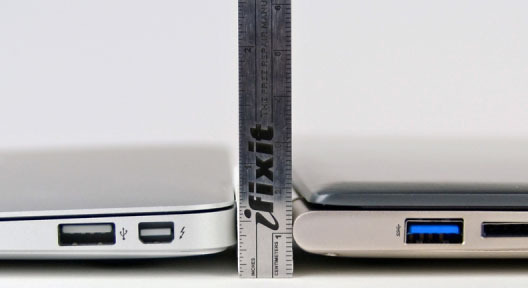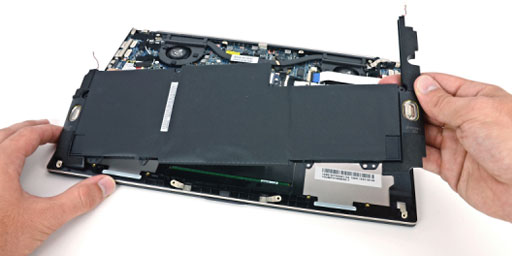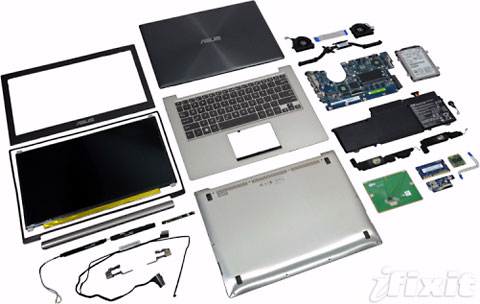General Apple and Mac desktop news is covered in Mac News Review. iPad, iPod, iPhone, and
Apple TV news is covered in iOS News
Review. All prices are in US dollars unless otherwise noted.
Purchases made through links to Amazon.com and
Apple's iTunes/iBook/App/Mac App Store support Low End Mac.
News & Opinion
Reviews
Tech Trends
Software
News & Opinion
OS X 10.8.1 Reportedly Improves MacBook Battery
Life Issue
Softpedia reports that the first OS X Mountain Lion point update -
version 10.8.1 (see this week's
Mac News Review) - may improve battery life considerably on Apple's
laptop computers, according to a registered Apple developer who has
confirmed anecdotally that fixes coming in 10.8.1 not only "resolve all
the reported battery drainage issues" that came with the release of
10.8, but that the improvement in battery life is "quite substantial" -
by as much as four hours, which if generally repeatable, is pretty
huge.
The unnamed developer happily reports that he's now able to use his
MacBook throughout the day again without being obliged to carry a
charger.
Publisher's note: We're following this story. Mac Observer
reports that an older MacBook Pro saw a battery life improvement
with 10.8.1 while a Retina MacBook Pro actually got worse. I'm sure
we'll know a lot more next week. dk
Link: Developer Confirms
OS X 10.8.1 Improves Battery Life Substantially on MacBook
Computers
Some Retina MacBook Pro Owners Complain of
Interface Lag
MacFixIt's Topher Kessler reports that some Retina MacBook Pro
owners are finding that their systems display relatively choppy
behavior and may be slow to respond with moving windows, scrolling, and
using Exposé, among other similar tasks, primarily when using
Safari, Mail, and Mission Control features - but also in other
programs. Kessler advises that while hardware limitations may be a
factor, choppy or laggy scrolling and window movement on Retina MacBook
Pros might be remedied by an OS reinstallation, among other
options.
Link: Some Retina
MacBook Pro Owners Seeing Interface Lag
Apple's 'Sealed Unit' Mac Designs Impose Costly
Tradeoffs
Computerworld's Richard Hoffman says his first self-purchased Mac
was a Power Mac 8500,
which despite its boring beige enclosure was a truly great machine, one
of the qualities making it great being that almost every feature was
upgradable, enabling a useful service life of more than 10 years during
an interval when computer hardware and architecture was advancing
rapidly.
By contrast, Apple's new top-of-the-line 15" MacBook Pro with Retina
Display is fast, powerful, and stylish, setting new standards for what
is to be considered a full-featured laptop computer. But the gorgeous
form factor comes at a stiff cost. Hoffman notes that iFixit, in its
teardown analysis, gave the Retina MacBook Pro the lowest possible
score, 1 out of 10, due to its almost complete lack of repairability
and upgradeability, with no user-replaceable parts whatsoever,
including the battery and even RAM, which is hard-soldered to the logic
board with no upgrade slot provided.
Hoffman notes that for some time the trend with Apple has been
toward making its consumer-oriented hardware - iPhones, iPods, iPads,
and entry-level Macs - more and more sealed-unit devices by design,
with no hardware-level upgradeability, but until now Apple's pro-level
computers have continued to be both more expensive than the company's
consumer lines, but also, in general, much more upgradable.
The more expensive part still obtains, but the Retina MacBook Pro
indicated that the upgradability, expandability, and repairability
paradigms are being shifted. Recently updated "old school" 15" and 13"
models are still available with memory and storage drive upgrades
supported and reasonably repairable architecture, but for how much
longer? The currently available models are likely last-of-the-line lame
ducks, with the rMBP indicating a future of sealed-unit, utterly
non-upgradable MacBook Pros - a troubling trend for many professional
and power-users.
Hoffman notes that Apple's shift in philosophy and focus will affect
the calculus for deciding how to configure a new Mac at time of
purchase, with RAM and storage drive upgrades at a later date no longer
possible.
His advice? "Max it out, or be prepared to replace the whole thing
sooner rather than later," acknowledging that compared with the old
strategy of buying basic initially and upgrading later, both the
short-term cost and overall cost of computer ownership will increase
substantially.
Link: Apple's Elegant
'Sealed' Mac Designs Come with a Costly Tradeoff
Reliable Cloud Spells Grim Outlook for Hard Drive
Makers
The Register's Chris Mellor contends that the Cloud is going to
impact disk drive manufacturers' bottom line in a big way, the
inescapable logic being that with the increasing popularity and success
of Dropbox, iCloud, SkyDrive, etc., users won't need disk drives on
their computers - a grim prospect for Seagate, Toshiba, and Western
Digital.
Mellor notes that his Dropbox account synchs files among an iMac two
notebooks, and a tablet, three of the four devices having flash memory
and no disks, although he does back up everything on the desktop and
notebook systems to external disk drives.
Mellor says that every day he uses cloud-based file synch, and his
files are available and synchronized between his systems, which
increases his confidence in the Cloud's reliability, reasoning "I don't
keep all my cash in a hardware container in my house. Why should I keep
my data in hardware containers in my house?" Compelling point, however
he's not quite ready to say good-bye to hard drive storage yet, noting
that he likes having the disks that hold his data in hand and doesn't,
as yet, trust the Cloud to be always there when he needs it - and
certainly doesn't trust his internet service provider to be always
there when he needs it. Also, he likes Apple's Time Machine to restore
files.
Mellor says if Time Machine worked with Apple's iCloud and
iCloud/SkyDrive/Dropbox was rock-solid and the internet service was
rock-solid, he probably would never buy a disk drive again, but that's
an awful lot of "ifs."
The danger for hard drive vendors, however, is that arguably few
computer users are as belt-and-suspenders fastidious about data backup
as Mellor (and your editor), and with a bit of enhancement to network
and cloud storage service reliability, millions or even tens of
millions of desktop and notebook PC users will stop buying disk drives,
not to mention the trend to solid state storage in laptops - and
increasingly desktops as well - with a likelihood that over the next
five years consumer desktop, notebook, and external disk drive sales
will decline dramatically toward a full-scale collapse.
Editor's note: Your editor uses Dropbox to sync files among three notebooks
and an iPad, three of the four still having disk drives, and I spread
backup among three largish external hard drives. cm
Publisher's note: At Low End Mac headquarters, we use Dropbox to
sync files among three desktop Macs, all of which are hard drive-based
(and backed up to hard drives as well), and there have been several
times when the ability to recover a previous version of a file has
saved our bacon. If only backing up to the Cloud were as easy and
inexpensive as Dropbox! Services like Dropbox are wonderful, but they
work best in conjunction with local storage. dk
Link: Watch Out, PC Disk
Drive Floggers: Cloud Will Rust Up Those Spinners
Reviews
PCMag Reviews Mid 2012 11" MacBook Air
PCMag's Joel Santo Domingo says that Apple's latest iteration of the
11" MacBook Air makes a
nice system for users who want a second or third Mac around the house -
a MacBook for those who already have a larger MacBook Pro, an iMac, or
a Mac Pro, but he notes that Windows ultrabooks are catching up to the
paradigm-setting Air in terms of portability and capabilities, and at
the 11" Air's price slot, competition is becoming fierce.
Santo Domingo observes that the little Air's full keyboard makes it
a better writing tool than simply carrying around an iPad or other
tablet. It fits perfectly on an airplane tray table system and weighs
in at a feather-light 2.36 pounds (2.79 pounds with AC adapter), but
the standard 64 GB of flash storage is mighty stingy in a contemporary
context, battery life is mediocre by current measure, the display is
smaller than those of Ultrabook price competitors. There's no SD card
reader, the nearly two-year old design is getting a bit long in the
tooth, and while the smallest Air is reasonably speedy, it's really
best suited for mobile writing and college student duty or as as a
secondary laptop for when you need more than a tablet.
Link: Apple MacBook Air
11-inch (Mid 2012)
Tech Trends
iFixit Tears Down Asus UX32VD Zenbook
Ultrabook
iFixit's team has torn apart a Zenbook UX32VD, Asus' flagship
Ultrabook and say the Zenbook lives up to its name, giving them very
little frustration during deconstruction.
 Even
though falls short (or, more accurately, exceeds thickness-wise) by a
couple of millimeters in the slimness race against the MacBook Air,
iFixit says the Zenbook more than makes up for it with stellar
repairability. With an upgradeable RAM slot, swappable 2.5" hard drive,
and a battery that can be easily replaced, the Zenbook earns an 8 out
of 10 iFixit repairability score, easily trumping the
soldered-RAM-and-proprietary-SSD MacBook Air's meager 4 points. Even
the LCD is completely replaceable, provided you're handy with a heat
gun and exercising a bit of patience.
Even
though falls short (or, more accurately, exceeds thickness-wise) by a
couple of millimeters in the slimness race against the MacBook Air,
iFixit says the Zenbook more than makes up for it with stellar
repairability. With an upgradeable RAM slot, swappable 2.5" hard drive,
and a battery that can be easily replaced, the Zenbook earns an 8 out
of 10 iFixit repairability score, easily trumping the
soldered-RAM-and-proprietary-SSD MacBook Air's meager 4 points. Even
the LCD is completely replaceable, provided you're handy with a heat
gun and exercising a bit of patience.
Bottom line? You can have a slim laptop that is repairable. It just
can't bear a fruit logo on its display.
Teardown Notes
Despite being a formidable Ultrabook in its own right, the Zenbook
UX32VD is often criticized for its thickness. All things considered,
the "bulging waistline" of the Zenbook isn't all that considerable.
When compared with a MacBook Air, it's only a few millimeters thicker
at the spine.
The stylish aluminum lower case is held in place with twelve T5 Torx
screws. The cover itself is not the same quality you'd find in an Apple
product, but iFixit applauds Asus' use of nonproprietary screws.
 The first component to come out is the battery. Point for
repairability! The battery is not glued in place, and a person equipped
with the right tools can replace it in a matter of minutes.
The first component to come out is the battery. Point for
repairability! The battery is not glued in place, and a person equipped
with the right tools can replace it in a matter of minutes.
The 7.4 volt, 6520 mAh battery in the UX32VD weighs 280.5 grams,
accounting for approximately 20% of the Zenbook's weight. By
comparison, the battery in the 13" MacBook Air is approximately 22% of
the Air's total weight at 300 grams - pretty much a negligible
difference.
The Zenbook comes standard with a 500 GB, 5400 RPM 2.5" hard disk
drive, in addition to 24 GB of onboard SSD storage. Compared to its
rivals, iFixit suggests that a 5400 RPM hard drive seems a bit out of
place in a $1,300 laptop.
Because fans are responsible for circulating the air through the
computer, they are often the component that collects the most dust.
Having fans that are easy to access like in the UX32VD are important
for making a device that is easy to maintain.
It appears as though Asus didn't put too much effort into enforcing
their warranty. The "void" sticker isn't some fancy disintegrating kind
just a sticker that actually retains a good amount of stickiness even
after removal. iFixit hastens to add that they're not saying you should
defraud companies; just stating fact.
Electronic goodies abound:
 Intel
Core i7-3517U 1.9 GHz processor
Intel
Core i7-3517U 1.9 GHz processor- NVIDIA GeForce GT 620M GPU
- Hynix H5TQ2G83CFR 2 GB DDR3 SDRAM
- Hynix H5TQ2G63DFR 1 GB DDR3 video SDRAM
- SanDisk iSSD SDIS5BK 024G 24 GB SSD
- Intel BD82HM76 platform controller hub
- ON Semiconductor NCP3218 synchronous buck controller
- ITE IT8572G
- Fairchild PC78T FDMC7696
- Richtek RT8168B PWM Controller
- Realtek ALC269 audio codec
Yes: the UX32VD has 1 GB of onboard video RAM.
Like the MacBook Pro with Retina Display, the touchpad in the
Zenbook is located underneath the battery. Unlike the MacBook, though,
you can remove this touchpad without destroying the battery.
Not only is there no obnoxiously glossy front glass on the Zenbook's
display, but the bezel comes off pretty painlessly after applying some
heat and using guitar picks to separate it from the display. But right
as iFixit's team were about to go ga-ga over the accessibility of this
display, they had to catch themselves: the LCD and camera cables are
routed underneath a rubber gasket that was installed with a formidable
adhesive, and required lots of heat and patience to peel up.
A 2 MP video camera and a Realtek 5828T camera controller keep all
of your recording and video chatting in check. In case you are
wondering, the camera board is really thin. Without the components on
it, it measures at ~0.3 mm, which is about the thickness of three
pieces of paper stacked together.
Link: Asus Zenbook
UX32VD Teardown
Software
smcFanControl Updated to Version 2.4
smcFanControl 2.4 is an open source utility that enables Intel Mac
users to adjust the minimum speed of the computer's cooling fans.
smcFanControl 2.4 adds the following features/bugfixes:
- Support for OS X Mountain Lion/Gatekeeper
- Support for Retina MacBook Pro
- smcFanControl is now a 64 Bit application
- AutoStart works now without AppleScript
- Support for OS X 10.4 is deprecated
- The source code for smcFanControl is now available at Github
System requirements:
- Mac OS X 10.4 and up (note that support for OS X 10.4 is
deprecated)
- Intel
smcFanControl 2.4 is freeware/donationware.
Publisher's note: It's installed and running on our 2007 Mac mini
with OS X 10.6.8 Snow Leopard. Recommended! dk
Link: smcFanControl
Bargain 'Books
For deals on current and discontinued 'Books, see our 13" MacBook and MacBook Pro,
MacBook Air, 13" MacBook Pro, 15" MacBook Pro, 17" MacBook Pro, 12" PowerBook G4, 15" PowerBook G4, 17" PowerBook G4, titanium PowerBook G4,
iBook G4, PowerBook G3, and iBook G3 deals.
We also track iPad,
iPhone, iPod touch, iPod classic, iPod nano, and iPod shuffle deals.

 Even
though falls short (or, more accurately, exceeds thickness-wise) by a
couple of millimeters in the slimness race against the MacBook Air,
iFixit says the Zenbook more than makes up for it with stellar
repairability. With an upgradeable RAM slot, swappable 2.5" hard drive,
and a battery that can be easily replaced, the Zenbook earns an 8 out
of 10 iFixit repairability score, easily trumping the
soldered-RAM-and-proprietary-SSD MacBook Air's meager 4 points. Even
the LCD is completely replaceable, provided you're handy with a heat
gun and exercising a bit of patience.
Even
though falls short (or, more accurately, exceeds thickness-wise) by a
couple of millimeters in the slimness race against the MacBook Air,
iFixit says the Zenbook more than makes up for it with stellar
repairability. With an upgradeable RAM slot, swappable 2.5" hard drive,
and a battery that can be easily replaced, the Zenbook earns an 8 out
of 10 iFixit repairability score, easily trumping the
soldered-RAM-and-proprietary-SSD MacBook Air's meager 4 points. Even
the LCD is completely replaceable, provided you're handy with a heat
gun and exercising a bit of patience. The first component to come out is the battery. Point for
repairability! The battery is not glued in place, and a person equipped
with the right tools can replace it in a matter of minutes.
The first component to come out is the battery. Point for
repairability! The battery is not glued in place, and a person equipped
with the right tools can replace it in a matter of minutes. Intel
Core i7-3517U 1.9 GHz processor
Intel
Core i7-3517U 1.9 GHz processor
